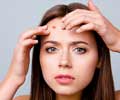A new study conducted by researchers at the University of California has found that it is not just one, but a combination of two abnormal factors, that cause adult acne or rosacea.
Adult acne is a common condition which affects fair-skinned people of mostly north-western European descent. It begins as erythema (flushing and redness) on the central face and across the cheeks, nose, or forehead but can also less commonly affect the neck and chest.It is linked with a type of bacteria, and antibiotics are prescribed to treat its symptoms. It, however, worsens over time.
During the study, Richard L. Gallo and his colleagues first observed in the laboratory that small proteins of the body's host defence system called anti-microbial peptides caused the exact symptoms like redness, an increase in visible blood vessels, bumps or pimples, that rosacea did.
"When we then looked at patients with the disease, every one of them had far more peptides than normal." Nature magazine quoted Gallo as saying.
The researchers examined the source of these molecules to know why these patients had abnormal peptides.
The precursor form of these peptides, called cathelicidin, is known to guard the skin against infection. A deficiency of cathelicidin correlates with increased infection in other skin diseases.
Advertisement
Rosacea patients also had high levels of enzymes called stratum corneum tryptic enzymes (SCTE). These enzymes turned the precursor into the disease-causing peptide.
Advertisement
"Too much SCTE and too much cathelicidin leads to the abnormal peptides that cause the symptoms of this disease. Antibiotics tend to alleviate the symptoms of rosacea in patients because some of them work to inhibit these enzymes. Our findings may modify the therapeutic approach to treating rosacea, since bacteria aren't the right target," Gallo said.
Source-ANI
LIN/J











